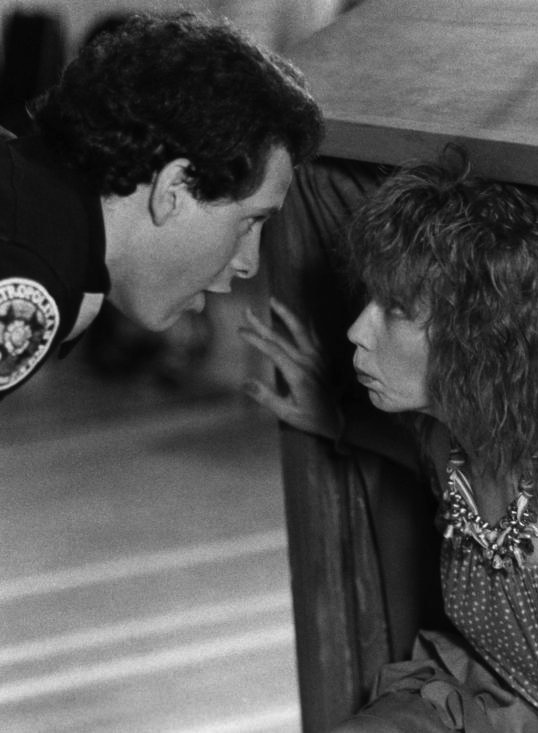Thursday, May 24, 1984
POLICE ACADEMY. Co-written by Neal Israel and Pat Proft. Music by Robert Folk. Co-written and directed by Hugh Wilson. Running time: 95 minutes. Mature entertainment with the B.C. Classifier's warning: some coarse language, occasional nudity and suggestive scenes.
WHERE IS IVAN REITMAN NOW that we need him? A filmmaker with a real talent for team comedy, he might have made something worthwhile out of Police Academy.
Reitman, 37, produced 1978's National Lampoon's Animal House and directed both Meatballs (1979) and Stripes (1981). Hugh Wilson, the director of Police Academy, came to the project with no previous theatrical film credits, and it shows.
Wilson made his name in television, where he was a producer, writer and director on WKRP In Cincinnati. Maybe that's why his debut feature looks so much like the pilot episode of a TV series.
Though shot in Toronto, his film's setting is an unnamed American city where the police training facility has just been opened to all comers by a reform-minded female mayor. The school's staff officers resist this change, of course.
They are determined to wash out the "undesirables" as quickly as possible.
To generate laughs, screenwriters Wilson, Neal Israel and Pat Proft populate the place with a selection of squirrels. A too-large cast of single-note characters is headed up, naturally, by a slick charmer, Carey Mahoney (Steve Guttenberg) and his love interest, cute rich girl Karen Thompson (Kim Cattrall).
Included among their cartoon classmates are sad fat kid Leslie Barbara (Donovan Scott), gentle giant Moses Hightower (Bubba Smith), phoney Romeo George Martin (Andrew Rubin), gun nut Eugene Tackleberry (David Graf), Gerald McBoing-Boing clone Larelle Jones (Michael Winslow), a klutz called Douglas Fackler (Bruce Mahler) and a mouse named Laverne Hooks (Marion Ramsey).
Their major conflict is with martinet Lieutenant Harris (G.W. Bailey) and the hick finks — Chad Copeland (Scott Thomson) and Kyle Blankes (Brent Van Hoffman) — that he recruits to help him. It all ends with a final "big test" in which the various participants get something like their just desserts.
What we're offered in Police Academy is a collection of lightweight skits designed to give the various actors an opportunity to be noticed in the crowd. This scattergun approach to plotting makes some sense in a TV pilot, where the producers are hoping that somewhere in their stewpot a network executive will see something to his liking.
It makes less sense in a theatre, where audiences pay to see fully-formed films. Reitman delivers pictures that are satisfyingly complete.
Wilson, by contrast, is playing test and tease, the little TV game that's supposed to make us tune in next week: same time, same station.
An inconsequential confection, Police Academy wears its small screen ambitions rather too openly. Indifferent schlock of the broadcast kind, it is undemanding and largely unoriginal.
The above is a restored version of a Province review by Michael Walsh originally published in 1984. For additional information on this archived material, please visit my FAQ.
Afterword: Indicative of what passed for humour in Police Academy was Georgina Spelvin's character name in the film's credits: C.S. Hooker. Yes, it could be a reference to T.J. Hooker (1982-1986), William Shatner's then-current TV cop show. It could also allude to CS Blues, director Robert Frank's notorious 1972 rock documentary about The Rolling Stones. Spelvin, celebrating her 79th birthday today, was involved in the launching of two successful film franchises. Director Gerard Damiano's influential The Devil in Miss Jones (1973) was followed by five sequels and a 2005 remake. Police Academy, despite few positive reviews, spun off six sequels and two TV series. The first three sequels — P.A. 2: Their First Assignment (1985); P.A. 3: Back in Training (1986); P.A. 4: Citizens on Patrol (1987); — were all shot in Toronto, and featured Steve Guttenberg reprising his Carey Mahoney role. (Spelvin also returned, playing a somewhat more substantial role in Police Academy 3.)
Financially, the first Police Academy was a success story — made for $4.5 million, it earned nearly $82 million — and was a significant moment for Guttenberg, an actor whose career was always on the verge of taking off. After years of hard work by studio publicists, his failure to launch made his name synonymous with occupational bad luck. It was Guttenberg's co-star, Canadian Kim Cattrall, who gained lasting fame. A member of the ensemble cast of 1982's Porky's, the highest-grossing Canadian film of the 20th century, she became iconic playing the adventurous Samantha Jones during the six-season run of the HBO series Sex and the City (1998-2004). She has since reprised the role in the 2008 spin-off feature.
See also: Kim Cattrall, who grew up in B.C., did fine work playing opposite Jack Lemmon in the 1980 feature Tribute.
